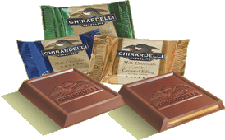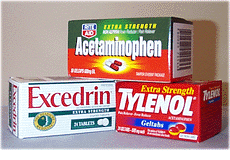Christmas Season Pet Hazards
Holiday season adornments are attractive to all creatures. The ornaments, foods, gifts, wrappings, ribbons, lights, and plants are all curiosities for pets. Pets investigate new items by sniffing, tossing, chasing, and finally by tasting. A few precautions are necessary to avoid the holiday crowds at the veterinary hospital.

The most common problems this time of year are stomach or intestinal disturbances caused by pets eating the holiday feast or other novelties. Scraps from the table can cause gastrointestinal upset and even predispose pets to life-threatening pancreatitis. Bones can get stuck in the mouth or perforate the intestinal tract and should be avoided. Chocolate is poisonous to cats, dogs, and birds. Plastic wrap and aluminum foil coated with good-tasting juices are enticing but can cause intestinal damage (and even blockage) if eaten by the pet.

Chocolate with Wrappers
Be sure to properly dispose of leftovers and wrappers. Feed pets their usual diet. Treats formulated similarly to the pet's regular diet are generally healthy and safe. Also keep in mind (while cooking) that pets may not know about hot stoves or to stay out from underfoot. Keep pets away so they don't get burned or get hot foods spilled on them.
Several decorative plants are poisonous. Mistletoe and holly can cause stomach upset with vomiting and diarrhea. The berries of these plants are attractive, easily swallowed, and potentially fatal if consumed. Poinsettias, like the leaves of most any plant, can also cause stomach upset. Use artificial mistletoe and holly; keep other plants out of your pet's reach.


Mistletoe and Holly
Be sure Christmas trees are secured so that pets cannot pull them over. Omit preservatives from the tree-stand water and cover the water so pets don't drink it. Don't spray snow on the tree unless it is labeled for pet consumption. Angel hair is spun glass and is irritating to both the inside and outside of your pet. Even glass ornaments and ornament hooks have been chewed and swallowed. These objects can cause problems from stomach upset to damaged intestines. Low-hanging ornaments are a real temptation, as are tinsel and electric lights. Decorative lights and electrical wiring can cause shock or burns when chewed, so remember to unplug holiday lights when pets are unattended.
Holidays have lots of activity going on. Be sure doors are not left open as guests come and go. Indoor pets inadvertently left outside could be injured by frostbite, cars, or other animals. Ice-melting chemicals and salt on sidewalks and roads can severely burn foot pads and should be washed off right away. Also, watch that guests don't leave interesting objects, such as chocolate, ribbons, stocking stuffers, or other illicit treats, within your pet's reach. Sometimes it's best to put your pet in a separate area, both to relieve the pet of the stress of new people and to prevent accidents.
Don't leave food items under the tree with an unsupervised pet; the wrapping, ribbon and enclosed gift are probably not compatible with your pet's digestive system. Ask Santa to put gifts out of your pet's reach so your pet won't beat you to them on Christmas morning.
When choosing a gift for your pet, consider the pet as an individual. Cats enjoy lightweight toys they can bat around, catnip toys, scratching posts, and kitty perches. Dogs like balls, chew toys, and things they can carry around. However, beware of toys with parts, such as bells, buttons, string, yarn, or squeaky parts, that can be detached and swallowed. Watch how your pet handles a new toy until you are sure it is safe. Some dogs treat a stuffed toy like a friend and carry it around and sleep with it. Others will tear them up and eat the stuffing and get into trouble. Also, if there is more than one pet in the household, consider all the pets before buying for any one of them. A one-inch diameter toy for a cat is fine, but a puppy in the household may swallow it and possibly require surgery to remove it.

If your pet does get sick, consult your veterinarian before giving any medications. Many of the over-the-counter drugs, such as acetaminophen
[ Search Articles ] [ Article Index ] [ Previous Page ]